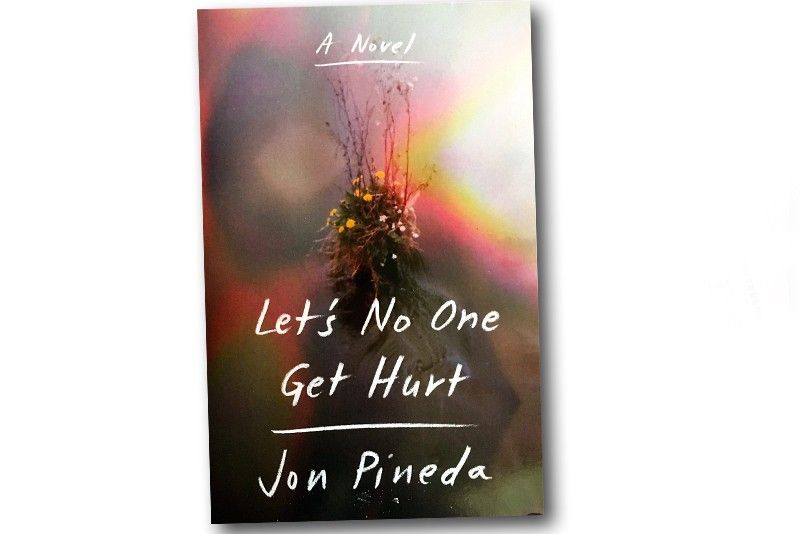The novel as poem


‘Let’s No One Get Hurt’ is ‘a coming-of-age story set equally between real-world issues of race, class, gender, and environmentalism, and a magical, Huck Finn-esque universe of community and exploration.’
If I recall correctly, I must have met Jon Pineda at the AWP conference in Chicago in 2004. I believe that’s how I came away with a copy of his first poetry book, Birthmark, which had won first place in the Crab Orchard Series in Poetry Open Competition Awards.
I reviewed it in this space, and also made it a point to hold up his poems as fine examples of delicacy and subtlety for a class I used to handle at the time, in Ateneo.
Eventually, I learned that his second poetry collection, The Translator’s Diary, had won the 2007 Green Rose Prize from New Issues Press. A memoir, Sleep in Me, was a 2010 Barnes & Noble Discover Great New Writers Selection, while his first novel, Apology, won the 2013 Milkweed National Fiction Prize. Another poetry collection, Little Anodynes, won the 2016 Library of Virginia Literary Award for Poetry.
Born in Charleston, South Carolina, and raised in Tidewater, Virginia, Fil-Am Jon Pineda attended James Madison University and the MFA program in Creative Writing at Virginia Commonwealth University. He currently teaches in the MFA program at Queens University of Charlotte and is a member of the creative writing faculty at the University of Mary Washington.
We lost touch for some time, and it wasn’t until recently that I got wind of his second novel that was seeing print soon. I got in touch with Jon again, and it didn’t take long for him to have his new publisher, Farrar, Straus & Giroux, to send over a review copy.
Let’s No One Get Hurt is a terrific read, with early blurbs marking it out as a Southern Gothic tale, also “a timely yet timeless coming-of-age story set equally between real-world issues of race, class, gender, and environmentalism, and a magical, Huck Finn-esque universe of community and exploration.”
It’s a first-person narrative told by 15-year-old Pearl, who has lost her mother and now “squats” with her father, a former literature professor, and a couple of men, his friends, in an abandoned boathouse by a river. They live without electricity, forage for food, setting fish traps and scouring for corn in the fields that separate them from “civilization.” Wild rabbits, ducks and snakes provide occasional meals. But mostly they go hungry, with the men passing time with drink, and music engineered by a cigar-box guitar that Dox plays.
Her father still uses a typewriter. He has taught her words like “virgule” and “anadromous.” She recalls how her mother had been writing a paper on Verlaine and Rimbaud, whom her father called his wife’s boyfriends. Her mother also used to tell her that poetry is never finished, but abandoned.
The cut-and-thrust narrative is thus fraught with poetry. Nebulous, vaporous, Pearl’s language dances between detailed delicacy and toughness.
“Aspire to precision, Pearl,” her father often admonishes her. So it’s how she describes each of her fellow-fringers.
“My father has become the kind of man who likes to wear a vest without a shirt. He is ripe and smells like what I remember of store-bought spices, back when my mother used to do all the shopping. He’s a dank mixture of cumin and turmeric, if I’m trying. His greying hair reaches past his shoulders. I turn my head the moment I see his nipples peek out from the sides of the vest. His nipples are brown and wrinkled like pecan meat.”
The similes are also a throwback to a world when she was better-fed.
“Fritter, at over three hundred pounds, resembles multiple copies of Dox sewn together. Unlike Dox, Fritter is motor-oil black, like he was spit out from some great big flame-throwing engine. His dreadlocks are a spectrum of burnt orange. When they’re not swept back, they writhe. It’s a wonder the two are even related.”
Fritter is working on a mural, “but the landscape has no faces or figures, none that I’ve been able to see. It’s just a solid wall of black paint rising in increments like a river from the buckled floors of his room.”
And of course the river is a character in the story, is a virgule, is poetry itself.
“The river gathers at my waist then runs long, sweeping folds down to my ankles. It feels like a fitted dress. I dive in. A layer from below rises and covers my thighs in gooseflesh. My legs start to kick free.
“… I can hear my mother at the pool’s edge, but I won’t open my eyes. I take huge breaths. The river’s bitterness slips into my mouth.
“With each stroke I’m putting on a new dress that slips from my shoulders.”
They care for an ailing dog named Marianne Moore. At the outset, the tension and menace revolve around her father’s wish to put the dog to sleep. But this is replaced by Pearl’s association with Mason, the scion of a wealthy family that has bought up the property that could include Pearl’s world.
The incidences of violence are muted, since Pearl has the talent for alienating herself from hurt. In lieu of horrifying comeuppances, indelible images remain: the fly-fishing lesson she receives from Fritter, or the large catfish that Pearl brings home, to have the men happily clapping at her feat. But she accidentally lets it fall back into the river when it’s just been skinned in preparation for three meals.
Before Marianne Moore reappears at the end, and takes over the narration, Pearl has already given us a memorable character who knows herself and her world no end.
“I sprint beyond being a girl in my own body.
“I become an idea.
“I know I’m not a woman yet.
“But I’m also not a girl.
“I’m a poem no one will ever translate.”



















